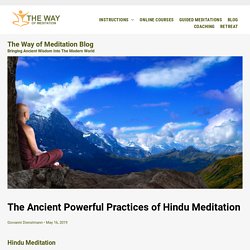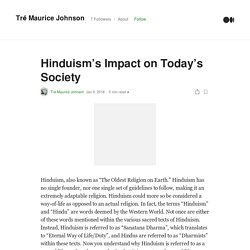

What Is Hinduism? The Ancient Powerful Practices of Hindu Meditation. Hinduism is a religion, or a way of life, found most notably in India and Nepal.

With approximately one billion followers, Hinduism is the world’s third largest religion by population, and the majority religion in India, Nepal and Bali (Indonesia). Hinduism has been called the “oldest religion” in the world, and some practitioners and scholars refer to it as Sanātana Dharma, “the eternal law” or the “eternal way” beyond human origins. Most notably yoga and meditation have emerged as popular spiritual practices in modern times that stem from the Hinduism. Below is an outline of the rich and varied types of meditation from the Hindu tradition, how to do them and includes links to further resources to help you on your path: Origin & Meaning A mantra is a syllable or word, usually without any particular meaning, that is repeated for the purpose of focusing your mind. How to do it As most type of meditations, it is usually practiced sitting with spine erect, and eyes closed. Is it for me? America's long and complex relationship with Hinduism. Last week marked the death anniversary of Mahesh Yogi, the Indian guru who brought transcendental meditation to the West in the sixties and became a spiritual teacher to The Beatles, comedian Jerry Seinfeld, and countless other celebrities.

Today, the legacy of the Maharashi, as he was popularly known, is evident in the widespread appreciation of meditation: Over 6 million people worldwide practice the technique the Maharishi introduced—transcendental meditation. An even larger number practice other forms. Health professionals and practitioners extol its many benefits, which range from anger management, lowered blood pressure and cardiovascular disease, reduced post-traumatic stress, and simply a healthier lifestyle. 9 myths about Hinduism, debunked. Suhag Shukla knows that's how some people outside Hinduism see her religion.

As the co-founder of the Hindu American Foundation, Shukla clarifies misconceptions all the time. Hinduism is ancient, though there is no specific date for when it was formed. The name is a Sanskrit word; Hinduism and Hindu were coined by invaders who used the terms to refer to the people they encountered when they crossed the Hindu Kush mountains and arrived at the Indus River. In America, Hinduism's profile was elevated by Indian immigrants who brought their customs and rituals with them and perhaps most recently, by the growing popularity of Hindu teachings like yoga and meditation.
Hinduism is the world's oldest living religion and the third largest -- behind Christianity and Islam -- with more than 1 billion followers. And it remains a mystery for many. Myth No. 1: There are 330 million Hindu gods Reality: There is one supreme God that cannot be fully known or understood. Myth No. 3: Hindus worship cows. Hinduism’s Impact on Today’s Society. Hinduism, also known as “The Oldest Religion on Earth.”

Hinduism has no single founder, nor one single set of guidelines to follow, making it an extremely adaptable religion. Hinduism could more so be considered a way-of-life as opposed to an actual religion. In fact, the terms “Hinduism” and “Hindu” are words deemed by the Western World. Not once are either of these words mentioned within the various sacred texts of Hinduism. Instead, Hinduism is referred to as “Sanatana Dharma”, which translates to “Eternal Way of Life/Duty”, and Hindus are referred to as “Dharmists” within these texts. Many people follow the teachings of Hinduism without actually considering themselves to be a Hindu by faith, including atheists. Hinduism has done more than influence the non-religious side of society; it has influenced other religions as well. Ayurvedic healing is a medicinal influence Hinduism has made on society. The individual - Hindu beliefs - Edexcel - GCSE Religious Studies Revision - Edexcel - BBC Bitesize.
Purpose of Life in Hinduism - UK Dharma Celebration. Hinduism is the third largest religion of the world.

The followers are known as Hindus and it holds 15-16% of the world population. Hinduism contains various philosophies associated with cosmology, shared concepts, pilgrimage to sacred sites and recognisable rituals. Even in Hinduism, the purpose of life is also beautifully described. In Hinduism, human life is not only about getting into this world but it is also about living a blissful life, enjoying the blessings, and leading towards the end, i.e., death.
Hinduism is a religion which is a blend of rituals, beliefs, and philosophy. Hinduism Way of Life If you believe everything happens for a reason, then God too had created this universe for a reason. Hinduism - Origins, Facts & Beliefs. Hinduism is the world’s oldest religion, according to many scholars, with roots and customs dating back more than 4,000 years.

Today, with about 900 million followers, Hinduism is the third-largest religion behind Christianity and Islam. Roughly 95 percent of the world’s Hindus live in India. Because the religion has no specific founder, it’s difficult to trace its origins and history. Hinduism is unique in that it’s not a single religion but a compilation of many traditions and philosophies. Hinduism Beliefs Some basic Hindu concepts include: Hinduism embraces many religious ideas.